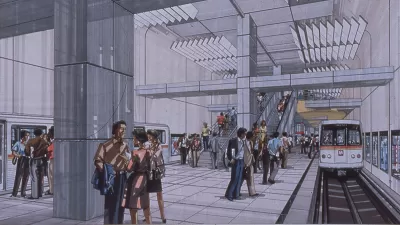John King argues that the city's new guidelines may leave too many loopholes open, potentially defeating their purpose: well-integrated new buildings.

Design critic John King praises San Francisco's intent, but raises doubts about the effectiveness of a new set of urban design guidelines. "The inherent subjectivity of such standards could muddy the waters rather than lead to better buildings, which is what we really need."
The issues King raises are architectural; the guidelines don't impact density. The document "wouldn't affect the low-slung residential districts of the city, which have their own guidelines, and it wouldn't alter the height or bulk of what's allowed in the neighborhoods and commercial districts covered by the new guidelines."
Loopholes and vague language are the main worry. By trying to be all things to all people, the guidelines could backfire and become meaningless. "Part of the problem is that no document can defuse the perennial tension between San Franciscans who want new buildings to look as if they've been here all along, and those who want the city to be a contemporary showcase on par with Barcelona or Rotterdam."
On a deeper level, King worries that "standards that upgrade the sorriest proposed buildings also can be applied so joylessly and dutifully that imaginative architecture gets pressed into a predictable mold."
FULL STORY: Do urban design guidelines help or hinder growing cities?

Planetizen Federal Action Tracker
A weekly monitor of how Trump’s orders and actions are impacting planners and planning in America.

Maui's Vacation Rental Debate Turns Ugly
Verbal attacks, misinformation campaigns and fistfights plague a high-stakes debate to convert thousands of vacation rentals into long-term housing.

San Francisco Suspends Traffic Calming Amidst Record Deaths
Citing “a challenging fiscal landscape,” the city will cease the program on the heels of 42 traffic deaths, including 24 pedestrians.

Amtrak Rolls Out New Orleans to Alabama “Mardi Gras” Train
The new service will operate morning and evening departures between Mobile and New Orleans.

The Subversive Car-Free Guide to Trump's Great American Road Trip
Car-free ways to access Chicagoland’s best tourist attractions.

San Antonio and Austin are Fusing Into one Massive Megaregion
The region spanning the two central Texas cities is growing fast, posing challenges for local infrastructure and water supplies.
Urban Design for Planners 1: Software Tools
This six-course series explores essential urban design concepts using open source software and equips planners with the tools they need to participate fully in the urban design process.
Planning for Universal Design
Learn the tools for implementing Universal Design in planning regulations.
Heyer Gruel & Associates PA
JM Goldson LLC
Custer County Colorado
City of Camden Redevelopment Agency
City of Astoria
Transportation Research & Education Center (TREC) at Portland State University
Jefferson Parish Government
Camden Redevelopment Agency
City of Claremont




























